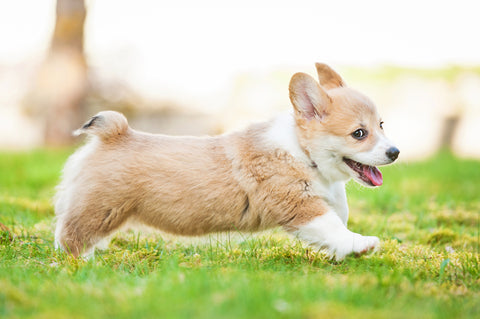Activity Level: Above Average
Hypoallergenic: No
Social Ability: Friendly
Skills: Herding, Agility
Intelligence: Above Average
Ideal Climate: Temperate, Warm
Pembroke Welsh Corgis are adored for their adorably short stature and classically canine faces. Their fiercely loyal nature and high intelligence means a PWC makes a fantastic companion, worker, or both.
Breed Overview
 Origin: Pembroke Welsh Corgis are descendants from the Spitz family of dogs, a group recognized by their thick white fur and pointed muzzles. The Spitz’s origins have been lost to history, but it is believed that these ancient canines came to western Europe from Siberia or Antarctica. This harsh land helped these dogs develop an alert and vigilant nature that remains to this day. Their thick fur and undercoats had evolved for icy tundra, the remnants of which are seen in the Corgi’s dense fur. The first time these dogs were officially recognized as their own breed was in 1788 when Johann Friedrich Gmelin named them Canis Pomeranus in his revision of Systema Naturae, a European book of species in nature.
Origin: Pembroke Welsh Corgis are descendants from the Spitz family of dogs, a group recognized by their thick white fur and pointed muzzles. The Spitz’s origins have been lost to history, but it is believed that these ancient canines came to western Europe from Siberia or Antarctica. This harsh land helped these dogs develop an alert and vigilant nature that remains to this day. Their thick fur and undercoats had evolved for icy tundra, the remnants of which are seen in the Corgi’s dense fur. The first time these dogs were officially recognized as their own breed was in 1788 when Johann Friedrich Gmelin named them Canis Pomeranus in his revision of Systema Naturae, a European book of species in nature.
History: Having descended from ancient dogs of Siberian and Antarctic wastelands, Corgis were coveted for their independent abilities in herding and alerting. These intelligent canines were easily trained and could fulfill tasks on homesteads, farms, and ranches with ease. Thanks to their short and muscular frames, these agile canines are built for endurance and therefore were kept in these roles for decades.
Records show old Welsh stories passed down through the oral tradition included tales of Corgis working in tandem with fairies. Some stories had Corgis working as war horses for the fairies, which gave the breed a mystical origin before their then-current jobs as herders. Around the 1940’s, breeders allegedly borrowed from these tales and told new magical stories to promote the breed across Great Britain, to moderate success. Throughout the twentieth century and into the twenty-first, Corgi popularity dwindled and spiked, and they would eventually land on England’s list of ‘vulnerable’ breeds due to their decreasing adoption rates. After the 2017 release of Netflix’s The Crown, a show about the English royal family starring both humans and Corgis, the numbers changed. There were more Corgis registered in December of 2017 than in the entire rest of the year combined. By 2022, Pembroke Welsh Corgis would rank 11th on the American Kennel Club’s list of most popular dog breeds.
Fun Fact: Her Majesty Queen Elizabeth II had over 31 Corgis during her reign, and when she would get gowns fitted, she would carry magnets to prevent her royal pups from stepping on dropped pins.
Breed Attributes
 Temperament: Corgis enjoy feeling included and involved with whatever their humans are doing, so they’ll most likely follow you just about everywhere. Because of this loyal nature, they tend to be highly trainable and fast learners. While they probably won’t be herding anything around your backyard, their vigilant nature and willingness to bark as an alert make them great watchdogs. With a task to keep them occupied, a Corgi should feel fulfilled and therefore content; without tasks and toys to keep their mind engaged, any dog can exhibit unwanted behavior such as getting into the trash. Be sure to provide ample space for play and puzzle toys for your dog, especially if you’re away.
Temperament: Corgis enjoy feeling included and involved with whatever their humans are doing, so they’ll most likely follow you just about everywhere. Because of this loyal nature, they tend to be highly trainable and fast learners. While they probably won’t be herding anything around your backyard, their vigilant nature and willingness to bark as an alert make them great watchdogs. With a task to keep them occupied, a Corgi should feel fulfilled and therefore content; without tasks and toys to keep their mind engaged, any dog can exhibit unwanted behavior such as getting into the trash. Be sure to provide ample space for play and puzzle toys for your dog, especially if you’re away.
It is also important to socialize your Corgi with other animals of varying sizes and ages. This helps reinforce good habits and allows them to interact and play with others. Due to their working background, Corgis can be both intelligent and stubborn, so socialization shows them where they stand on the social hierarchy very clearly.
Personality: Corgis are known to be playful and affectionate, especially with their family whom they trust. When it comes to new friends, human or non, your Corgi may only need a little time to adjust, and they’ll be ready to play. Because they are so open to new people and animals, Corgis tend to enjoy trips just about anywhere, from the pet store to the dog park.
 Their vigilant nature means they may bark at seemingly nothing, but they believe they are alerting you to a real threat. Be sure to pay attention to your dog’s barking habits to ensure no threat is present. If they are safe, they ought to be praised for their vigilance and alertness. Corgis respond well to positive reinforcement and affection, so it is recommended to use friendly words, pets, and treats to encourage good behavior.
Their vigilant nature means they may bark at seemingly nothing, but they believe they are alerting you to a real threat. Be sure to pay attention to your dog’s barking habits to ensure no threat is present. If they are safe, they ought to be praised for their vigilance and alertness. Corgis respond well to positive reinforcement and affection, so it is recommended to use friendly words, pets, and treats to encourage good behavior.
Ideal Owner: You! Pembroke Welsh Corgis make fantastic companions, and their boundless love for their owner does not go unnoticed by any of their friends. As their owner, you’ll always be in good company with a Corgi by your side.
Fur Care
 Grooming: Grooming a Corgi’s coat is not as difficult as it may seem. Their fur is indeed thick, but its straight texture is easy to brush with a bristled brush. Regular brushing helps not only remove loose fur and dead skin, but it also helps stimulate blood flow to the skin to bolster dermatological health.
Grooming: Grooming a Corgi’s coat is not as difficult as it may seem. Their fur is indeed thick, but its straight texture is easy to brush with a bristled brush. Regular brushing helps not only remove loose fur and dead skin, but it also helps stimulate blood flow to the skin to bolster dermatological health.
Bathing a Corgi is a relatively simple task, as these dogs tend to enjoy the bonding time and may even enjoy the water. Our Oatmeal Aloe Shampoo for Corgis is a fantastic option for a quick bath to cleanse and deodorize without harsh ingredients. For itchy skin or skin allergies, we recommend our Tea Tree Shampoo to address the source.
Shedding: Corgis are not hypoallergenic, as they shed about as much as the average dog. Shedding can be managed with two important factors. Your dog’s hydration and nutrition contribute to skin health; if their diet is missing essential nutrients such as Omega 3 fatty acids, a fish oil supplement replenishes and nourishes. On the outside, skin health can be affected by harsh chemicals in low-quality shampoos, outdoor allergens, and household cleaners used in their space. Gentle pet cleansers such as our Tearless Puppy Shampoo or no-water-needed Grooming Wipes are great options to keep your pet clean without irritating the skin which can cause more shedding
Colors: Tan with brown and white markings
More to Know: Under ancient Welsh laws, criminals were subject to severe punishment if they stole a Corgi, more so than a crime involving any other breed. We’re not sure who would steal a dog, but rest assured they were caught!
Health
 Common Issues: Thanks to centuries of responsible breeding and natural genetic diversity, PWCs are generally healthy dogs with only a few predispositions to talk to their veterinarian about. Many canine breeds are susceptible to joint and hip dysplasia, an abnormality in the joint tissues that can cause pain and immobility. Early signs of joint issues may be easy to miss, but supplementing their diet with a joint support supplement nutritionally supports joint mobility, flexibility, and comfort to help prevent joint issues in the future.
Common Issues: Thanks to centuries of responsible breeding and natural genetic diversity, PWCs are generally healthy dogs with only a few predispositions to talk to their veterinarian about. Many canine breeds are susceptible to joint and hip dysplasia, an abnormality in the joint tissues that can cause pain and immobility. Early signs of joint issues may be easy to miss, but supplementing their diet with a joint support supplement nutritionally supports joint mobility, flexibility, and comfort to help prevent joint issues in the future.
Corgis are also predisposed to degenerative ocular issues and cardiac conditions. Regular veterinarian visits are essential to check for early warning signs of these health conditions and to assess your dog’s individual wellness.
We also recommend asking your veterinarian about Von Willebrand's Disease (VWD), a bleeding disorder that can often be found early in their life with a simple test. Corgis are prone to VWD, but dogs with this illness can live long and happy lives with appropriate treatment.
Nutrition: All canines need plenty of protein in their diet from high-quality sources such as beef or poultry. Their food should be based in meat and contain added vitamins and minerals. Even the best commercial pet foods are often missing other essentials, however, such as omega 3 fatty acids. That’s why veterinarians recommend supplementing their diet with a canine multivitamin for a boost of nutrients, antioxidants, and more.
Lifespan: 12-13 years
Physical Activity
 Training: Pembroke Welsh Corgis are highly trainable due to their instincts to follow their leader. They can be trained to follow verbal commands and potentially to follow hand signals. Professional training is recommended for every dog, as training helps keep them calm and content in nearly any environment. Feeling comfortable in their surroundings is an important aspect of managing anxiety, to which high-energy dogs are prone. Instead of bottling up their energy and vigor, training helps them stay calm and follow your lead.
Training: Pembroke Welsh Corgis are highly trainable due to their instincts to follow their leader. They can be trained to follow verbal commands and potentially to follow hand signals. Professional training is recommended for every dog, as training helps keep them calm and content in nearly any environment. Feeling comfortable in their surroundings is an important aspect of managing anxiety, to which high-energy dogs are prone. Instead of bottling up their energy and vigor, training helps them stay calm and follow your lead.
Exercise: Every dog needs plenty of time outside, playing, and interacting with others, human or animal. Exercise gives them an outlet for energy and promotes cardiovascular health. Corgis tend to enjoy running and jumping over obstacles, which they are very good at thanks to their small, agile frames.
Daily exercise and walking are essential for Corgis to stay physically and mentally healthy. Without regularly releasing their energy and tiring themselves out, dogs can become frustrated and act out in aggression or unwanted behaviors. To help stave off boredom, make sure your Corgi gets outside one to two times every day and has access to plenty of interactive toys.

Pembroke Welsh Corgis have been royal companions and family pets for centuries, and they still enjoy the royal treatment. These sweet and sassy dogs bring fun to any environment they’re in, and they’ll follow you just about anywhere.

